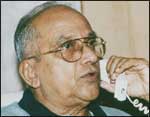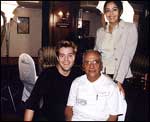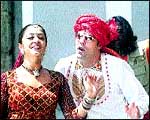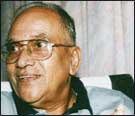'Little John, lot of fun!'
 Flight delays don't faze him at all.
Flight delays don't faze him at all.
In fact,
Singeetham Sreenavasa Rao loves it. It gives him the chance to let his imagination run wild and flesh out the innumerable storylines buzzing around in his busy head.
At 69, Srinivasa Rao has made nearly 60 films in Tamil, Telugu, Kannada and Hindi.
He won a National Award for his second film,
Dikkatta Parvathi, based on Chakravarthi Rajagopalachari's (Rajaji) famous novel. After making many socially relevant films, Srinivasa Rao switched to humorous films.
He became so good at it that the humour also worked in silence. Witness
Pushpak, starring Kamal Hasan and Amala.
Among his other popular films are
Appu Raja, Raja Paarvai, Mayuri, Tataram Marindi, Michael Madana Kama Rajan, Haalu, and Jaenu.
Now, Rao has gone international. His latest film,
Little John, which was released on April 14, the Tamil New Year's day, is a multilingual production. The film -- produced by Media Dreams, the entertainment division of Pentamedia -- has been made in English, Tamil and Hindi.
In the offing from this man who loves to experiment are a full length musical and a full-length animation film.
Shobha Warrier met the unassuming, very accessible director. Excerpts:
Your father was a schoolmaster and your mother a violinist. How did you get into movies?
My mother was not a professional player. It was because she loved the violin that she learnt and played it. I think I might have inherited that creative urge from her.
Right from my school days, I was interested in writing plays and acting in them. I had also written articles and done some sketches for a magazine called Swatantra, which came to be known later as Swarajya.
My father had an excellent sense of humour. I think I inherited a bit of that! (laughs) Even at the age of 85, even when he was in a hospital bed, he could laugh at himself. He used to say that he decided to study Philosophy because Mathematics and Science were cumbersome. And anybody can learn and write Philosophy!

Even though all my relatives wanted me to join the government service, my father gave me full freedom to study what I really wanted and loved.
After I graduated, I felt I could satisfy my creative urge and my love for storytelling only if I joined the film industry, since I loved films. So I did.
It was an unusual profession to opt for in those days, wasn't it?
Yes, it was. Even now, I am the only person from my family who is in films. Neither of my daughters is interested in films.
You have always wanted to be director K V Reddy's assistant...
Yes. I will tell you the reason. I used to see a lot of films those days. Then, one day, I happened to see a film called Bhakta Podana by K V Reddy. The film ran for more than a year.
I was so captivated by the film that I wanted to be a film director. Not only that, I wanted to be his assistant.
A friend of his introduced me to him. The first thing he said was, "Filmmaking is not what you think. It is very difficult."
It took me a couple of years to convince him that I really wanted to assist him.
Finally, he asked me to adapt She Stoops To Conquer. I wrote a screenplay, and he was satisfied with my effort.
He said, "You have the necessary sense of drama and ability to tell a story. Ultimately, what matters is what you tell and how you tell it. That will come with experience."
What exactly was it about the film by K V Reddy that attracted you?
When I watched the film, I was one with it.
See, whenever I watch a film, I am conscious of the fact that I am a spectator. But in the case of this film, I was not at all conscious that I was watching a film. For example, it happened to me even after I joined the film industry.
Another film that made me forget the whole world was How Green Was My Valley.
We get that feeling when we read an interesting book too...
Yes, but again, not all books can make you forget yourself and make you one with the ambience. I had that kind of experience when I read certain books of Victor Hugo.
Have you noticed, we can experience that oneness with fictional characters only when we are young? I got the feeling till the age of 18. After that, I lost the capacity to get into the minds of the characters.
Is it because we lose innocence as we grow older?
I think so. When I tell my grand daughter a story about a demon and a magician, she can feel it and enjoy it but not an adult. I am not able to do that today. I have lost the child in me.
When I started making movies, my effort was to get back the childish innocence that is lost. More than story telling, I wanted to unearth the child in each spectator.
My family always complains that I talk to myself too much.
You mean, while writing the script?
No, when I am alone. For example, if my flight is delayed, and I am asked to wait at the airport, I donít get perturbed at all. I start thinking about the scenes that I am going to create and I see all those characters around me. I talk to them, I laugh with them and I also cry with them.
I get totally lost in their world.
People watching me probably think that I am mad!
Is there any part of you in the characters that you create?
Maybe. I have created most of my characters from observation, from what I have read but there is a part of me in all the characters.
Let me tell you an incident. I have made a film called Iru Nilavukal in which Kamal Hasan had a double role. One of the characters was an absent-minded doctor. After two or three days of shooting, I realised that he was imitating me. And he did it so brilliantly! (laughs)
Tell us how Pushpak happened.
For that, I have to go back a little. I was working for him as an assistant for a film based on a folk tale.
As he was narrating, the writer of the story said, 'the hero and his comedian friend enter a cave, and the comedian says, dear friend, the cave is dark. I am scared'.

K V Reddy reacted sharply, 'you should talk about such things in a visual medium. You should show the expressions of the actors that they are scared, and you should do it in the dark'.
The writer replied, 'I know that sir. But I do not know what sort of a cameraman and what kind of actors you have. If the cameraman is not competent enough to take a frame in the dark, and if the actor cannot give proper expressions, at least my dialogue will convey the story!' We all had a hearty laugh!
Our films are dependant on dialogues. Why can you see subtle acting only in the West? Because their films evolved from the silent days. Our films began with the talkies. There were not many silent movies here. So, even today, dialogue is more important than facial expression and visuals.
There are brilliant directors in India who have made use of visuals very well, like Satyajit Ray, Raj Kapoor and Shantaram. But by and large, Indian film industry is dependant on talkies.
Since that is so, I thought it would be a challenge to make a film without dialogues. Many people described Pushpak as a silent movie. It is not a silent movie; it is a film without dialogues. The sound effects are there in the film except dialogues. The screenplay is written in such a way that we cannot hear any dialogues. For example, whenever the drunkard tried to say something, something is stuffed into his mouth.
Pushpak is considered a landmark in the history of Indian cinema.
When I made Pushpak, nobody thought that it would be successful. But after it's success, many people wanted me to make more such dialogue-less films. But I was not interested. My fascination was for the first one that I made.
Now I want to make a musical; a film that has only songs and no dialogues. Characters talk to each other in songs. Nobody has done such a film in India till now. It will be diametrically opposite to Pushpak.
Like our old folk theatre?
Yes, But I am giving it a modern look.
So you need actors who can sing, donít you?
I am looking for such performers who can sing tolerably well. He or she need not be a professional singer but they should be able to sing.
Was it difficult to write a screenplay where you had to convey all the emotions and tell the story through visuals and expressions?
At first I thought it would be very difficult. But once I started writing, ideas just flowed and I had three hours of script with me.
Did you feel like talking while writing the script?
No, no. I did only gesticulate while writing! And, on the set, we made a lot of improvisation. We had an excellent cast too.
While shooting the film, it might have been a different experience, with nobody talking...
It was very strange. None of the actors believed that the film would be successful. They had their doubts including Kamal Hasan. After one schedule, I showed them what we had shot and they were convinced. It was a thrilling experience.
Finally, when you saw the product, did you also laugh?
Yes, it was enjoyable.
Kamal Hasan has been the hero in some of your other films too. What do you like about his acting?
Both of us have a good sense of humour and our wavelengths match. We can also laugh at ourselves.
Besides, he is such a creative artist that it is wonderful to work with him. He has great regard for my decisions, judgment, frankness and openness. Whenever I tell him, this is not what I want, he comes out with ten other variations immediately.
But I have made films with many other artists. For example, I have made more than a dozen films with Dr Rajakumar.
You have made films in all South Indian languages except Malayalam.
I made a film in Malayalam, Niraparayum Nilavilakkum, a long time back. It was a very interesting experience. Senior artistes like Sheela and Ummer were there in the film.
Usually, in Tamil and Telugu films, artists come at nine, have breakfast, and then learn the dialogue and start the shots at 10 or 10.30. But for this film, I finished my breakfast at eight, and asked the assistant director if the artistes are ready. He said yes! They had even learnt their dialogues by then.
 I was stunned, and embarrassed too because I was not accustomed to such discipline. I had not seen such discipline in the sets of any of my other films. The sincerity with which artists work in Malayalam is amazing. In fact, I wish I had done more films in Malayalam.
I was stunned, and embarrassed too because I was not accustomed to such discipline. I had not seen such discipline in the sets of any of my other films. The sincerity with which artists work in Malayalam is amazing. In fact, I wish I had done more films in Malayalam.
What is important for a film to succeed?
I will tell you an incident.
Once I had told K V Reddy that people call (success in) filmmaking either luck or ability. I asked him about what he called it. He said, "getting a story idea or a line is luck. Making it into a film shows oneís capability".
Why is it that all films of Raj Kapoor or Shantaram or AVM Chettair are not successful? Sometimes they get the right story and the right blend with which people vibrate. But not always. Even Shakespeare could not produce the same magic in all his works. I don't have any explanation for this.
Your first film Dikkatta Parvathi was totally different from the humorous films that you made later. You even won a National Award for it.
Yes, I did. Actually, I wanted to make a film based on the story of a writer who hated films. I knew Rajaji hated films and that was the reason why I wanted to make a film based on him.
So I met him and told him about what I wanted. He immediately asked me, 'Who said I hated films? I hate bad films.' But he gave me the story.
Did he like your film?
By the time the film was ready, he was no more. I wish he were there. I won a National Award for the film.
Tell us something about Little John.
I was supposed to do an English film Five And A Half Hours To Dawn for Pentamedia.
For various reasons, the film got postponed. In the meanwhile, I thought of Little John.
The story is about an American who comes to India as an archaeologist. The film gives a lot of scope for special effects. It is a social fantasy with lots of humour in it. It is made in three languages: English, Hindi and Tamil.
Who is your best critic?
I think I am my own best critic.
Over the years, I have found that the intelligentsia takes time to discover a classic. But the common masses find it within seconds.
Like the Raj Kapoor films. Some of them were torn apart by the critics, but today, all of them have become classics.
Why do you feel so?
This is because the child in the ordinary man is much more alive and active. If you ask them individually, they may not be able to tell you anything about the film but as a mass, they enjoy it and react to it.
Photograph: Sreeram Selvaraj